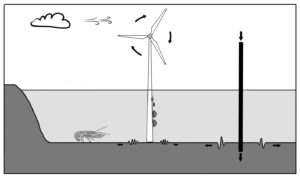

Research projects

- Research area
Environmental impact marine biology and aquaculture
- Institution
University of Hull
- Research project
The impact of windfarm associated noise on commercially important benthic invertebrates
- Lead supervisor
Dr Thomas Breithaupt (Senior Lecturer - Faculty of Science and Engineering, University of Hull)
- PhD Student
- Supervisory Team
Dr Thomas Breithaupt (Senior Lecturer - Faculty of Science and Engineering, University of Hull)
Dr Krysia Mazik (Benthic ecologist, University of Hull)
Dr Silvana Birchenough (Principal ecologist, Marine Climate Change Centre, Cefas)
Dr Nathan Merchant (Principal scientist, Noise and Bioacoustics team, Cefas)
Project Description:

The need for clean energy has triggered a rapid increase in offshore windfarm installations. Little is known about the associated environmental impact. Windfarm developments emit sound and vibrations during construction (e.g. by pile driving, drilling), operation and decommissioning. Our recent finding that crabs and mussels show behavioural and physiological responses to minute vibrations of the seafloor (Roberts et al. 2015, 2016) indicates high susceptibility of the benthic fauna to such acoustic disturbances. The longer-term effects of such disturbances on invertebrate communities are not known. It is crucial to understand the chronic impacts on benthic populations so regulators can provide guidelines for their protection.
This project aims to understand the impact of wind farm associated noise on commercial species such as lobsters and mussels. Lobsters form the basis of the internationally important fishery of the Holderness coast. Mussels are considered candidates for windfarm-based aquaculture but it is unclear whether the associated noise affects their growth. The aim of this project is to understand the impact that industrial noise (seabed vibrations) from construction, operation, and decommissioning of wind turbines has on seabed invertebrates such as lobsters and mussels. We hypothesise that benthic invertebrates when exposed to chronic noise will suffer physiological and behavioural impairments that can manifest at the population and community level.


